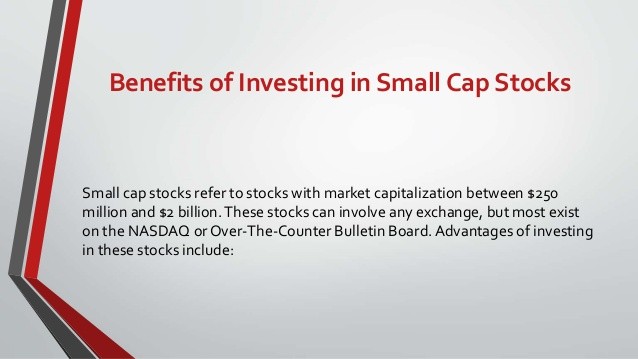Why Invest in Small Cap Stocks
Post on: 16 Март, 2015 No Comment

Why invest in small-cap stocks?
1) Higher Growth/Nimble Operations
Small companies grow from a smaller arithmetic base. It is easier to double sales of a $10 million company than sales of a $10 billion company. Small companies are often in growing industries and find it easier to change their strategy in response to market conditions. Smaller companies are often run by their founders or a small group of managers who are more motivated to increase shareholder value.
2) Greater universe of opportunities
The 80-20 rule of investing: 80% of Wall Street research is focused on under 20% of publicly traded companies, those with market capitalizations of over $1.5B. This leaves a large number of companies with scant analyst coverage. With few investment managers performing in-depth research on small cap firms and the rest relying on conventional research, an astounding number of small cap companies get overlooked. Focusing on this larger number of undiscovered companies increases the odds of uncovering hidden value.
3) Inefficient market
Because few, if any, brokerage firms cover small companies, there is a greater possibility of market inefficiencies. Because most small companies have relatively few shares freely trading, a liquidity problem exists. This liquidity problem prevents many large institutions from investing in these companies. This reduces the number of buyers for the stock and can cause the stock price to be unjustifiably low. Conversely, when a large buyer tries to buy an illiquid stock, the price can go up dramatically. This inefficient environment works to our advantage: we aim to accumulate the undervalued shares and hold on to them for the long term. A small company that grows and performs well will draw more attention, increasing trading volume and driving up valuation.
4) In-Depth Research can make the difference
One of our favorite things is to roll up our sleeves and really try to understand a small company, its lifecycle, its management, and its prospects. In many cases, we kick the tires, going above and beyond information readily available on the Internet and in public financial filings. For example, we have called retail outlets across the country while researching a consumer products company and have inspected facilities of many companies from Ohio to China. Because large investment firms cannot invest in smaller companies, our analysts are often the first ones to visit in several quarters or even years. Management of small companies are far more accessible and our analysts typically establish good rapport with top management. Once we invest in a small firm, we try to help them with investor relations to enhance shareholder value.
Risks associated with investing in smaller companies
It is important to keep in mind that investing in smaller companies can be particularly risky.

1) Small-cap stocks have lower trading liquidity which means that there may not be enough sellers of shares at an acceptable price when we want to buy or that we would not be able to sell shares quickly at an acceptable price when we want to sell. Additionally, low trading liquidity results in higher transaction costs.
2) Smaller companies have less financial resources and limited access to capital compared to larger companies. This may make it more difficult to obtain financing to pursue new growth opportunities or to endure economic and industry downturns.
3) Some small companies do not have long operating histories or proven business models. This can make small companies more vulnerable to aggressive competition from larger competitors or regulatory scrutiny. A small company is less likely to have a following of loyal customers who believe in its business model, leaving it more exposed to risk from rapid shifts in customer preferences.
4) Less information is publicly available about small companies than large companies. First Wilshire’s analysts and portfolio managers rely to some extent on the integrity of company management, auditors, and the applicable regulators charged with oversight.
All investing involves risk, including the possible loss of principal. There can be no assurance that any investment strategy will be successful. Please read our Risks and Considerations. 2009 First Wilshire Securities Management, Inc. Site designed by POP .














